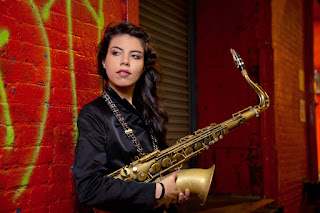Melissa Aldana's 'Visions': Transmuting an art icon into jazz
Frida Kahlo has come to stand for more than her tortured life and painfully evolved personal style as a visual artist. The Mexican symbol of individualized feminism in art has lately been taken up by a rising star of the tenor saxophone, the Chilean-born Melissa Aldana.
In "Visions" (Motema) she leads a quartet (expanded to a quintet for all but three of the 11 pieces) to honor Kahlo, whose life and art have generated extensive film, opera, and biographical treatment. A key element of Aldana's approach to this ensemble tribute is that fifth player, vibraphonist Joel Ross, with whom she often plays in unison. (Ross was hailed as the new voice of the vibraphone by Nate Chinen yesterday on NPR's "Morning Edition".) As exemplified by "El Castillo de Velenje," the longest track on "Visions," Ross's tone has a watery shimmer that still avoids blurring his articulation when the tempo is fast. He's clearly motivated in his great solo here by the leader's torrential showcase preceding it.
Aldana plays in an unfettered manner, as if fearful of stasis. Her inventiveness is nonstop, and her sidemen's individuality also gets plenty of elbow room. Yet this doesn't mean that her tone fragments or coarsens. Almost uniquely among tenor saxophonists, she presents the same quality of sound in all registers. Up high, there's an alto-sax persona, with suggestions even of soprano sax at its most ethereal; she is similarly focused when moving into midrange and lower. But her playing maintains continuity of tone, full but not heavy, with no irresolute aspects to her phrasing. Throughout jazz history, we've heard plenty of tenor saxophone, some of it at genius level, designed to exploit a tendency to talk to oneself. Aldana gives us something else.
Rarely does she put forward a breathy quality, an exception being the disc's one standard, "Never Let Me Go," which opens with a solo cadenza. This is an understandable departure from her normally conservatory-perfect sound, probably for the sake of connecting with the tenor ballad tradition stemming from Coleman Hawkins and running through Ben Webster. Sam Harris' piano solo applies fresh harmonies to the piece and gets inventive about phrasing to help justify the song's inclusion in an otherwise all-original program.
Harris sometimes yields to a tendency to noodle, as on bassist Pable Menares' soft-spoken, somewhat languid "Perdon," but otherwise he shares with the leader a purposefulness that serves the music well. As for the Kahlo inspiration behind the compositions, the listener must infer it from time time and not expect it to be explicit. I heard the music hinting at the painter's highly charged manipulation of personal symbols in "Elsewhere." That tune maintains a restlessness characterized by lots of rhythmic interplay among the group, driven by Tommy Crane's drums. Here Kahlo's struggles seem to have found original expression in another genre.
"Visions" helps to further Aldana's reputation for outstanding creative drive on an instrument that has long tended to be overrepresented in jazz. Her skill as a bandleader and composer should keep her profile high.
 |
| Melilssa Aldana pays tribute to Frida Kahlo in "Visions." |
In "Visions" (Motema) she leads a quartet (expanded to a quintet for all but three of the 11 pieces) to honor Kahlo, whose life and art have generated extensive film, opera, and biographical treatment. A key element of Aldana's approach to this ensemble tribute is that fifth player, vibraphonist Joel Ross, with whom she often plays in unison. (Ross was hailed as the new voice of the vibraphone by Nate Chinen yesterday on NPR's "Morning Edition".) As exemplified by "El Castillo de Velenje," the longest track on "Visions," Ross's tone has a watery shimmer that still avoids blurring his articulation when the tempo is fast. He's clearly motivated in his great solo here by the leader's torrential showcase preceding it.
Aldana plays in an unfettered manner, as if fearful of stasis. Her inventiveness is nonstop, and her sidemen's individuality also gets plenty of elbow room. Yet this doesn't mean that her tone fragments or coarsens. Almost uniquely among tenor saxophonists, she presents the same quality of sound in all registers. Up high, there's an alto-sax persona, with suggestions even of soprano sax at its most ethereal; she is similarly focused when moving into midrange and lower. But her playing maintains continuity of tone, full but not heavy, with no irresolute aspects to her phrasing. Throughout jazz history, we've heard plenty of tenor saxophone, some of it at genius level, designed to exploit a tendency to talk to oneself. Aldana gives us something else.
Rarely does she put forward a breathy quality, an exception being the disc's one standard, "Never Let Me Go," which opens with a solo cadenza. This is an understandable departure from her normally conservatory-perfect sound, probably for the sake of connecting with the tenor ballad tradition stemming from Coleman Hawkins and running through Ben Webster. Sam Harris' piano solo applies fresh harmonies to the piece and gets inventive about phrasing to help justify the song's inclusion in an otherwise all-original program.
Harris sometimes yields to a tendency to noodle, as on bassist Pable Menares' soft-spoken, somewhat languid "Perdon," but otherwise he shares with the leader a purposefulness that serves the music well. As for the Kahlo inspiration behind the compositions, the listener must infer it from time time and not expect it to be explicit. I heard the music hinting at the painter's highly charged manipulation of personal symbols in "Elsewhere." That tune maintains a restlessness characterized by lots of rhythmic interplay among the group, driven by Tommy Crane's drums. Here Kahlo's struggles seem to have found original expression in another genre.
"Visions" helps to further Aldana's reputation for outstanding creative drive on an instrument that has long tended to be overrepresented in jazz. Her skill as a bandleader and composer should keep her profile high.



Comments
Post a Comment